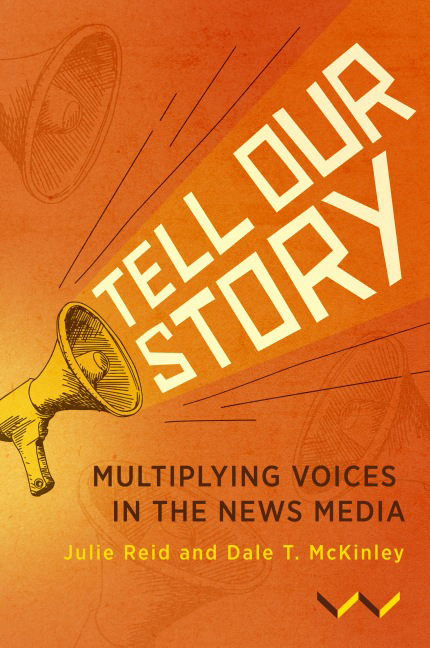Book contents
- Frontmatter
- Contents
- List of Figures
- Acknowledgements
- Abbreviations and Acronyms
- Chapter 1 The Importance of Voice and the Myth of the ‘Voiceless’
- PART 1 FROM THE INSIDE: VOICE(S) FROM THE GROUND
- Chapter 2 Community Perspective, Experience and Voice
- Chapter 3 Glebelands Hostel, Durban
- Chapter 4 Xolobeni, Eastern Cape
- Chapter 5 Thembelihle Community, Johannesburg
- PART 2 FROM THE OUTSIDE: DOMINANT VOICE
- Chapter 6 Dominant Media Telling and Elite Communication
- Chapter 7 The Political Economy of Dominant Power and Storytelling
- PART 3 NEW TRAJECTORIES FOR JOURNALISM AND VOICE(S)
- Chapter 8 Media Diversity and Voice(s)
- Chapter 9 Rethinking Media Freedom, Revamping Media Ethics
- Chapter 10 Planting the Seeds of Change
- Notes
- Bibliography
- Index
Chapter 1 - The Importance of Voice and the Myth of the ‘Voiceless’
Published online by Cambridge University Press: 10 September 2020
- Frontmatter
- Contents
- List of Figures
- Acknowledgements
- Abbreviations and Acronyms
- Chapter 1 The Importance of Voice and the Myth of the ‘Voiceless’
- PART 1 FROM THE INSIDE: VOICE(S) FROM THE GROUND
- Chapter 2 Community Perspective, Experience and Voice
- Chapter 3 Glebelands Hostel, Durban
- Chapter 4 Xolobeni, Eastern Cape
- Chapter 5 Thembelihle Community, Johannesburg
- PART 2 FROM THE OUTSIDE: DOMINANT VOICE
- Chapter 6 Dominant Media Telling and Elite Communication
- Chapter 7 The Political Economy of Dominant Power and Storytelling
- PART 3 NEW TRAJECTORIES FOR JOURNALISM AND VOICE(S)
- Chapter 8 Media Diversity and Voice(s)
- Chapter 9 Rethinking Media Freedom, Revamping Media Ethics
- Chapter 10 Planting the Seeds of Change
- Notes
- Bibliography
- Index
Summary
Voice as a process – giving account of oneself and what affects one's life – is an irreducible part of what it means to be human; effective voice (the effective opportunity to have one's voice heard and taken into account) is a human good.
— Nick Couldry, Why Voice MattersAs social animals, all human beings instinctively and naturally yearn to give an account of themselves and to tell their own stories. But, to operate as if certain peoples lack this desire or ability is to behave towards them as if they are not human (Couldry 2010). In recent years, philosophers and social scientists have pondered the notion of ‘voice’ as a type of catch-all phrase that infers more than the literal meaning of the word, that is, the sounds and words one makes when speaking. Jim Macnamara (2012) conceptualises ‘voice’ as more than the verbal act of speaking since it includes human communication of all types, such as voting, protesting, online participation and artistic production. More broadly, voice, or rather the ability to practise voice, relies on inclusion and participation in political, economic and social expression and processes, and involves affording people the space to actively contribute to decisions that affect their lives. Jo Tacchi (2008: 1) calls the denial of the right of peoples to participate in such activity, ‘voice poverty’.
Voice today is theoretically understood to encompass a broad spectrum of communicative activity, which includes: iterating one's view, story and position in the world; having that story or position listened to by others; having one's story recognised as something that matters; and, further, having it mediated or carried via a means of communication (such as the news media) to the broader collective or society. Admittedly, that is putting things rather simply because there are complex and multilayered problems and conditions relevant to each one of these steps. A number of writers examine the intricacies of this process, the notion of ‘voice’, its definition, its theorisation, its associated processes and, crucially, the characteristic challenges prevalent in the disablement of the effective practice of voice. Particularly notable among these is work done by Susan Bickford (1996), the research collective called the Listening Project (O’Donnell, Lloyd and Dreher 2009) and Nick Couldry (2009, 2010).
- Type
- Chapter
- Information
- Tell Our StoryMultiplying Voices in the News Media, pp. 1 - 24Publisher: Wits University PressPrint publication year: 2020



